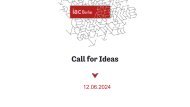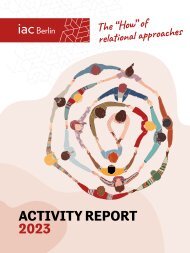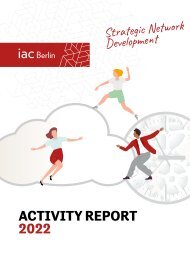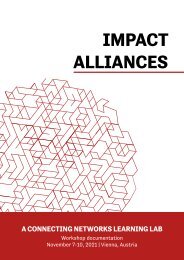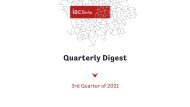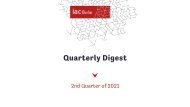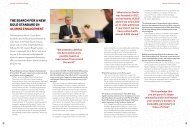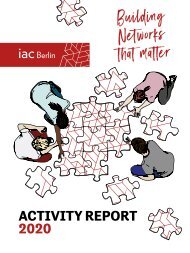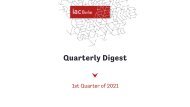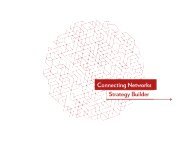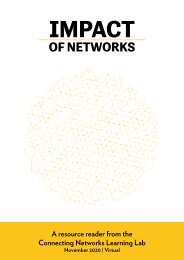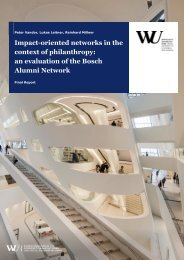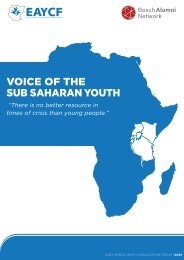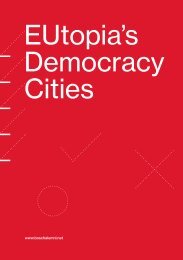iac Berlin - Activity Report 2021
As early as 1966, the philosopher Karl Popper addressed this issue and the limits of reductionism in his essay “Of Clouds and Clocks”. Only now we are starting to develop a language, models, and strategies on how to approach the “cloud-like” complex problems of our time. All articles in this Activity Report represent different approaches to learning and adjusting our network strategies accordingly. They span from the Bosch Alumni Network to the Global Diplomacy Lab, ANSTOSS DEMOKRATIE, the SDG Places, and the Wasan Community.
As early as 1966, the philosopher Karl Popper addressed this issue and the limits of reductionism in his essay “Of Clouds and Clocks”. Only now we are starting to develop a language, models, and strategies on how to approach the “cloud-like” complex problems of our time. All articles in this Activity Report represent different approaches to learning and adjusting our network strategies accordingly. They span from the Bosch Alumni Network to the Global Diplomacy Lab, ANSTOSS DEMOKRATIE, the SDG Places, and the Wasan Community.
You also want an ePaper? Increase the reach of your titles
YUMPU automatically turns print PDFs into web optimized ePapers that Google loves.
ACTIVITY REPORT<br />
<strong>2021</strong><br />
Creating Impact<br />
through Networks
Editorial<br />
Learning from and with each<br />
other provides the basis from<br />
which we co-create knowledge,<br />
experiences and concrete<br />
initiatives with our partners.<br />
DEAR COLLEAGUES, PARTNERS,<br />
AND FRIENDS,<br />
The field of philanthropy has proven that it can work quickly, flexibly, and on a basis<br />
of trust. In response to the COVID-19 pandemic and the war in Ukraine, foundations<br />
adapted their rules for giving, supported novel forms of collaboration across sectors,<br />
and invested in promising but uncertain outcomes. In doing so, they were able to<br />
pursue their strategic missions while laying the groundwork for their organizations<br />
to be more open to collaborative approaches.<br />
But what works in response to crises has not yet translated into changes to the core<br />
practices and principles of most philanthropic organizations. Why do foundations<br />
struggle to embed and embrace these open and collective approaches in their<br />
everyday business? Part of the answer lies in the conventional understanding of<br />
philanthropy’s role, which is bound to a transactional and causal impact logic that<br />
originates in a highly predictable world.<br />
However, our sense of urgency today is bigger than ever. We have years, not decades,<br />
to change in order to avoid systemic collapse. We no longer need to talk about<br />
whether collective approaches matter—we know that they do. Collaboration engages<br />
all actors that are essential to addressing an issue, allowing them to build a common<br />
understanding of the interconnectedness and complexity of a challenge, to test and<br />
learn together, and to leverage invested resources in a highly efficient manner.<br />
IMAGE CREDITS<br />
Cover: (hand) Shutterstock<br />
P. 3 <strong>iac</strong> <strong>Berlin</strong><br />
P. 4 Raum11 / Jan Zappner<br />
P. 5 (left) BMW Foundation Herbert Quandt;<br />
P.5 (right) Laura Léglise<br />
P. 8 unsplash<br />
P. 7 (graphic) Tina Kron<br />
P. 21 BMW Foundation Herbert Quandt<br />
P. 23 <strong>iac</strong> <strong>Berlin</strong><br />
P. 26 unsplash<br />
P. 28 (graphic) Anne Lehmann<br />
P. 29 unsplash<br />
IMPRESSUM / IMPRINT<br />
Veröffentlicht durch / Published by: International Alumni Center gGmbH, Linienstraße 65a, 10119 <strong>Berlin</strong>;<br />
Tel. +49 (0) 30 288 85 80 0; www.<strong>iac</strong>-berlin.org; info@<strong>iac</strong>-berlin.org<br />
Registergericht / Registered at: Amtsgericht Stuttgart, Germany; HRB 759544<br />
Geschäftsführer / Managing Director: Darius Polok<br />
Verantwortlich für den Inhalt im Sinne des Presserechts / Responsible for the content in terms<br />
of the press law: Darius Polok, Linienstraße 65a, 10119 <strong>Berlin</strong><br />
Chefredakteur / Editor-in-Chief: Tobias Gerber<br />
Beitragende / Contributors: Stephanie Don, Tobias Gerber, Vinzenz Himmighofen, Anna Katharina Lau,<br />
Lucie Menz, Darius Polok, Lea Schindler<br />
Design: Tina Kron<br />
Druck / Printing: Königsdruck Printmedien und digitale Dienste GmbH, Alt-Reinickendorf 28, 13407 <strong>Berlin</strong><br />
The question we face now is, ‘How?’ How do we apply open and collaborative<br />
approaches successfully, and how do we make them mainstream? Tim Draimin,<br />
senior fellow at the Community Foundations of Canada, predicts that an evolution of<br />
innovative, collaborative alliances and platforms will emerge in the coming years, and<br />
foundations will have a central role to play (read more on p. 11). This will only happen<br />
if we accept that at this transitional moment the need for rapid adaptation not only<br />
applies to our programs and approaches, but to the core of our organizations as well.<br />
At <strong>iac</strong> <strong>Berlin</strong> we are making our contribution through deep collaborations with<br />
colleagues and partners from around the world. The approaches we experimented<br />
with in <strong>2021</strong>, the learnings and questions we collected along our journey, we would like<br />
to share these with you in this <strong>Activity</strong> <strong>Report</strong>.<br />
Our work is made possible thanks to the financial support of the Robert Bosch<br />
Stiftung and the BMW Foundation Herbert Quandt. Our achievements are a result<br />
of deep and trustful relationships with colleagues, partners, and our fellow network<br />
members. Thank you to all of you. It’s a privilege to be connected with you through<br />
our shared ambition to build networks that matter.<br />
I wish you an inspiring and enjoyable time perusing our <strong>Activity</strong> <strong>Report</strong> <strong>2021</strong>.<br />
With warmest regards,<br />
Darius Polok<br />
Managing Director, <strong>iac</strong> <strong>Berlin</strong><br />
01
What we do<br />
CONTENT<br />
WHAT WE DO & HOW WE DO IT<br />
01<br />
03<br />
06<br />
07<br />
08<br />
Editorial<br />
What We Do & How We Do It<br />
Five Years of <strong>iac</strong> <strong>Berlin</strong><br />
The Bosch Alumni Network at a Glance<br />
Guiding Questions in <strong>2021</strong><br />
The <strong>iac</strong> <strong>Berlin</strong> was founded by the Robert Bosch Stiftung in 2017 with a<br />
unique double-mission: to establish a state-of-the-art alumni network of its<br />
grantees and to support the development of networks for social impact. Five<br />
years later, the <strong>iac</strong> <strong>Berlin</strong> and the Bosch Alumni Network are well recognized<br />
in the philanthropic field and have established numerous initiatives and<br />
activities. How did we start, where do we stand, and where are we heading?<br />
10<br />
12<br />
14<br />
16<br />
18<br />
20<br />
22<br />
24<br />
26<br />
27<br />
28<br />
How can Impact Alliances be a powerful tool<br />
in solving complex social challenges?<br />
How can we support the shift from a centrally organized<br />
to a decentralized network?<br />
How can a network support its members to become<br />
more effective agents of change?<br />
How can we create sustainable impact with a member-driven strategy?<br />
Why should organizations dare to embark on strategic experiments?<br />
How can physical places inspire positive change and contribute<br />
to the future of convening?<br />
How can we use the decentralized knowledge of a group<br />
to solve a specific challenge?<br />
How can non-profits and civil society organizations<br />
overcome the challenges to becoming sustainable?<br />
Finance & Accounting<br />
General Information<br />
Feedback from the Network<br />
For many years, foundations have built capacity, advocated<br />
for causes, facilitated connections, and offered a wide range<br />
of support. Yet few have found ways to empower individuals<br />
or organizations beyond the direct, time-bound support of<br />
their established programs. Spurred on by this observation,<br />
the Robert Bosch Stiftung – one of the major foundations in<br />
Europe – founded the International Alumni Center (<strong>iac</strong> <strong>Berlin</strong>)<br />
in 2017, which took up residence in a former industrial<br />
building in <strong>Berlin</strong> Mitte.<br />
<strong>iac</strong> <strong>Berlin</strong>’s mission is to be a center of expertise for impactoriented<br />
networks that contributes to the global development<br />
of its field. <strong>iac</strong> <strong>Berlin</strong> gathers knowledge and tests methodologies,<br />
sharing their outcomes with the Robert Bosch<br />
Stiftung and other foundations. <strong>iac</strong> <strong>Berlin</strong> also uses this<br />
knowledge in the second branch of its mission, where it has<br />
been instrumental in the establishment, curation, and further<br />
development of the Bosch Alumni Network. The network<br />
brings together former and current fellows, grantees, and<br />
employees of the Robert Bosch Stiftung and its partners.<br />
From the beginning, we strongly believed that networks can<br />
be a key asset and powerful tool for creating impact that is<br />
both effective and sustainable in the long term. The promise<br />
of networks lies in their:<br />
1. Participation and integration<br />
2. Innovation and resilience<br />
3. Adaptability and openness<br />
4. Efficiency<br />
This belief defines the activities of <strong>iac</strong> <strong>Berlin</strong> as well as the Bosch<br />
Alumni Network. We work together with other organizations<br />
on equal footing – no one in the lead, no one following behind<br />
– to co-develop solutions for positive social change.<br />
From the moment it was founded, our approach to the Bosch<br />
Alumni Network was contrary to the usual model of connecting<br />
grant-giver and grantee with the foundation as central<br />
steering entity that is predominant among foundations and<br />
universities – called the “hub & spoke” model in network theory<br />
– envisioning instead a multi-community network (see page 12<br />
for an example of this approach). Since 2017, we have therefore<br />
strived to develop the Bosch Alumni Network in a way that<br />
allows for decentralized connections between its members and<br />
which values alumni as partners.<br />
Developing the Bosch Alumni Network<br />
We started with many ideas and a stack of lists with programs,<br />
contacts, and a plethora of additional pieces of information<br />
from over 50 years of philanthropy at the Robert Bosch<br />
Stiftung. As a first step, establishing the digital platform<br />
www.boschalumni.net quickly became the linchpin of this<br />
endeavor, although convincing people to actually use the<br />
platform was no easy task. We realized that personal<br />
connections needed to be established or reactivated. We<br />
02 03
What we do<br />
needed to build trust in this new system. We needed shared<br />
experiences to create the emotional bonds that a network<br />
needs to feel like a home. The value of this approach was<br />
reflected in all kinds of personal gatherings all over the globe:<br />
from informal one-on-one exchanges in local cafés to huge<br />
meetings with dozens of participants in Kigali, Bologna, Paris,<br />
New York, and <strong>Berlin</strong>.<br />
With a growing number of members and activities, the platform<br />
became a lively go-to meeting place as well as a living<br />
archive of the fellows and programs generated through the<br />
foundation’s philanthropic work over the course of decades.<br />
With ever growing momentum, members not only benefited<br />
from the network, but co-developed it as well. Within a few<br />
years, further decentralization and the self-reinforcing effects<br />
of member activities empowered the Bosch Alumni Network<br />
to facilitate unexpected connections, new sustainable activities,<br />
and innovative approaches.<br />
In <strong>2021</strong>, the network achieved much more than originally<br />
expected. The number of members steadily increased to 7,500,<br />
members assumed more responsibility and active roles as part<br />
of ongoing decentralization, and the network’s outer edges<br />
became more permeable, which enabled it to build bridges<br />
with other networks. You can find examples of these strategies<br />
and activities on pages 12-13.<br />
Connecting Networks: Building<br />
networks in the field of philanthropy<br />
Around the same time that the Bosch Alumni Network was<br />
founded, <strong>iac</strong> <strong>Berlin</strong> also created Connecting Networks. This<br />
program brings together around 50 foundations and non-profit<br />
organizations that are working to strengthen and further<br />
develop their approaches to building networks. It offers<br />
network-builders a learning environment that functions on<br />
many different levels, offering regular training opportunities<br />
and peer exchange on topics such as shaping strategy, developing<br />
personal skills, solidifying organizational commitment,<br />
and building a community of peers. The development of this<br />
network of networks was propelled by a kick-off workshop in<br />
2017 and a strategy retreat in 2018. Together with its diverse<br />
community, Connecting Networks co-organizes up to two<br />
Learning Labs per year. After exploring the topic of “Impact of<br />
Networks” in 2020, a Learning Lab on “Impact Alliances” was<br />
held in Vienna, Austria, in <strong>2021</strong>, convening over 25 members.<br />
Together, participants explored the theory behind Impact<br />
Alliances before delving into practical case studies of Impact<br />
Alliances in action. Participants were joined by Tim Draimin<br />
of Community Foundations of Canada, who provided the<br />
theoretical background as well as concepts to help bring<br />
innovation and systems thinking into the core of foundations.<br />
You can find an interview with Tim Draimin on pages 10 and 11.<br />
The many roles of <strong>iac</strong> <strong>Berlin</strong><br />
For <strong>iac</strong> <strong>Berlin</strong>, working with partners does not stop at developing<br />
and discussing ideas. Rather, we work together to put them into<br />
action and create concrete initiatives as well. In this context, the<br />
<strong>iac</strong> <strong>Berlin</strong> assumes a variety of roles, ranging from host to incubator<br />
to adviser.<br />
One of the earliest such activities was the Global Diplomacy<br />
Lab (GDL). Founded in 2014, the GDL aims to advance inclusive<br />
and agile formats of diplomacy and international cooperation to<br />
deal with cross-border and global challenges. It is an initiative of<br />
the Federal Foreign Office in partnership with the BMW Foundation<br />
Herbert Quandt, the Robert Bosch Stiftung, the German-<br />
American Fulbright Commission, and the Slovenian Ministry of<br />
Foreign Affairs, with the <strong>iac</strong> <strong>Berlin</strong> holding the role of implementing<br />
organization since 2018. Since that time, the GDL has established<br />
a global ecosystem characterized by mutual accountability,<br />
respect, and inclusiveness, and has delivered positive transformational<br />
change. To maintain its effectiveness, the GDL has developed<br />
a new strategy titled, “GDL 2025: Diplomacy 4.0,” which<br />
embraces a wide variety of ideas that represent the diversity of<br />
GDL members and partners. You can explore how they created<br />
this strategy with a members-driven approach on pages 16-17.<br />
In <strong>2021</strong>, <strong>iac</strong> <strong>Berlin</strong> assumed the role of incubator for the first<br />
two years of ANSTOSS DEMOKRATIE. This “strategic<br />
experiment” was initiated to develop and test new ways to<br />
effectively collaborate on a systemic level. The initiative<br />
brought together the ERSTE Foundation, European Forum<br />
Alpbach Foundation, Robert Bosch Stiftung, Stiftung Mercator<br />
Germany, and Stiftung Mercator Switzerland. With the shared<br />
goal of strengthening democratic culture in Austria, Germany,<br />
and Switzerland, it tears down silos to bring together partners<br />
from politics, civil society, media, the private sector, and science.<br />
Find out how the organizations involved in this experiment<br />
perceived their participation, what they learned, and what<br />
challenges they had to face on pages 18-19.<br />
The SDG Places initiative was also founded in <strong>2021</strong>. The<br />
initiative works to complete the triangle between foundations,<br />
facilitators and inspiring spaces. SDG Places are driven by the<br />
conviction that every transformation at a systems level starts<br />
with individuals. These individuals need to step out of their<br />
everyday routines and comfort zones and open themselves to<br />
new perspectives and experiences in order to catalyze change.<br />
Therefore, spaces and inputs should appeal to all senses and<br />
invite exploration with open minds and open hearts. The BMW<br />
Foundation Herbert Quandt gave the first impulse for the<br />
initiative and was soon joined by the Robert Bosch Stiftung<br />
and the Porticus Foundation as partners, and the <strong>iac</strong> <strong>Berlin</strong> as<br />
its backbone. Discover more about how SDG Places enable<br />
sustainable positive change and can contribute to the future of<br />
convening on pages 20-21.<br />
Peer-learning and consultancy<br />
We believe in the positive, long-term effects of bringing<br />
together peers for exchange and cooperative learning formats.<br />
Similar to the Connecting Networks Learning Labs, we use<br />
commensurate approaches with various other partners who<br />
are often facing very specific and timely challenges. We<br />
balance the practical and cooperative aspects of the challenge<br />
with a sound theoretical framework. Pooling our experiences<br />
and networks, we learn from each other as well as with each<br />
other through consultations, workshops, and facilitated peer<br />
exchange, such as case clinics.<br />
Providing targeted support that ranges from network analysis<br />
to strategy development, we host virtual, physical, or hybrid<br />
workshops and co-learning events. We are uniquely positioned,<br />
in that we can not only research promising methodologies to<br />
support network building, but can also test them first-hand, e.g.<br />
in the Bosch Alumni Network. We then make the knowledge<br />
and experience gained from this cycle of theory and practice<br />
available to foundations, academia, public institutions, and<br />
non-profit organizations that want to build networks with social<br />
impact.<br />
As an example of this approach, the Kreisau Foundation did a<br />
2.5-day workshop with us in 2019 that became a cornerstone<br />
for their strategic renewal and resulted in the successful reform<br />
of their advisory council in <strong>2021</strong>. You can read more about this<br />
peer-learning workshop on pages 22-23.<br />
A shift towards deep collaboration<br />
Now, more than ever, we understand the global connectedness<br />
of major societal challenges. But any organization trying to<br />
solve them alone is bound to fail. Like these global challenges,<br />
the solutions must also be interconnected. We want to<br />
strengthen this understanding through all of our projects and<br />
collaborations.<br />
After an interesting, inspiring, and intense first five years, the<br />
<strong>iac</strong> <strong>Berlin</strong> is now a well-established Do & Think tank for impactoriented<br />
networks in philanthropy. We cooperate with other<br />
organizations on topics such as strengthening democracy,<br />
understanding the future of convening, and sustainability for<br />
non-profits. Likewise, we work on developing new governance<br />
structures, peer-learning situations, and much more.<br />
These activities are either carried out by the <strong>iac</strong> <strong>Berlin</strong> itself or<br />
as part of joint initiatives like the ones described in these pages.<br />
We strongly believe in sharing knowledge and providing open<br />
access to our experiences. Therefore, if there is anything you<br />
want to know about these or any related topics, please get in<br />
touch!<br />
www.<strong>iac</strong>-berlin.org<br />
04 05
FIVE YEARS OF IAC BERLIN<br />
THE BOSCH ALUMNI NETWORK AT A GLANCE<br />
Active on:<br />
Various possibilities to connect<br />
Our approach:<br />
We convene people across sectors<br />
and host communities.<br />
We incubate and coordinate networks and alliances.<br />
We support organizations and individuals.<br />
We learn with peers and share our knowledge.<br />
Guiding Principles:<br />
1. We create safe spaces and trust<br />
2. We work with openness and transparency<br />
3. We self-organize around our mission<br />
4. We contribute our commitment and<br />
responsibility<br />
5. We team up to achieve impact<br />
6. We use resources carefully<br />
7. We share knowledge and skills gained<br />
among each other<br />
Peer consultancies<br />
Events and workshops hosted in <strong>iac</strong> <strong>Berlin</strong>'s Community Space<br />
2017<br />
50+<br />
Members<br />
Events by members<br />
11<br />
9<br />
14<br />
2018<br />
2019<br />
150+<br />
160+<br />
8000<br />
7000<br />
6000<br />
5000<br />
400<br />
350<br />
300<br />
250<br />
4000<br />
200<br />
2020 Physical Community Spaces becomes the virtual Open Space on Zoom.<br />
3<br />
1<br />
<strong>2021</strong> Events continue to be held in the virtual community space.<br />
2017 2018 2019 2020 <strong>2021</strong><br />
Implementing five networks and initiatives<br />
3000 150<br />
2000<br />
100<br />
1000 50<br />
2017 2018 2019 2020 <strong>2021</strong> 2017 2018 2019 2020 <strong>2021</strong><br />
Projects by members<br />
Opportunities by members<br />
100<br />
250<br />
80<br />
200<br />
60<br />
150<br />
In <strong>2021</strong>, the network had:<br />
7,500 members<br />
from 140 countries<br />
150+ programs of the<br />
Robert Bosch Stiftung<br />
150 groups<br />
70 Regional Coordinators<br />
65 Impact Fields<br />
13 Impact Field Hosts<br />
40 100<br />
20 50<br />
Connecting Networks<br />
2017 2018 2019 2020 <strong>2021</strong> 2017 2018 2019 2020 <strong>2021</strong><br />
06 07
GUIDING QUESTIONS<br />
IN <strong>2021</strong><br />
Progress and innovation start with an<br />
inquisitive mind: Spend sufficient time<br />
asking the right questions and the path to<br />
a potential solution unfolds. In the pages that<br />
follow, we are pleased to share with you the<br />
big questions that kept us busy in <strong>2021</strong>.<br />
At <strong>iac</strong> <strong>Berlin</strong>, we like to begin with the question “why” to<br />
define our purpose, followed by “how” to develop the process.<br />
These two questions have guided us as we’ve established<br />
and developed <strong>iac</strong> <strong>Berlin</strong> and the Bosch Alumni Network over<br />
the past five years. Although we have embarked on many deep<br />
explorations on topics such as collaboration, networks, and<br />
impact, we regularly step back from our daily work to ask the<br />
hard questions that can put our efforts into perspective and<br />
re-affirm our strategic direction.<br />
In <strong>2021</strong>, we asked ourselves many such questions, including:<br />
How exactly can Impact Alliances tackle complex social<br />
challenges? How can we achieve the shift from a centrally<br />
organized network to a decentralized one? And, why should<br />
organizations dare to embark on strategic experiments?<br />
Thus began our journey for answers, where we organized<br />
Learning Labs, incubated new initiatives, and moderated<br />
discussions with peers. In the following pages, we will share<br />
eight big questions guiding our work in <strong>2021</strong> as well as the<br />
paths we co-developed in order to find solutions.<br />
Working in the field of philanthropy and beyond, many of us<br />
are faced with the same questions. However, the answers are<br />
never one-size-fits-all. This is where <strong>iac</strong> <strong>Berlin</strong> steps into its role<br />
as initiator and guide. If you see your own challenges, topics, or<br />
questions reflected in these pages, we hope to not only help<br />
you spark new ideas for solutions, but invite you to join us to<br />
discuss, collaborate, and find more answers together!<br />
08 09
How can Impact Alliances be a powerful<br />
tool in solving complex social challenges?<br />
Connecting Networks<br />
IMPACT ALLIANCES: THE NEXT EVOLUTION<br />
FOR PHILANTHROPY<br />
In November <strong>2021</strong>, the Connecting Networks<br />
community welcomed Tim Draimin<br />
as the keynote speaker at its Learning Lab<br />
in Vienna, Austria, on the topic of Impact<br />
Alliances. With years of experience in<br />
developing and managing Impact Alliances,<br />
Tim worked with participants as they<br />
explored the potential of deep collaboration<br />
to address complex challenges and to drive<br />
social innovation.<br />
Following up on the Learning Lab, Tim joined us for an<br />
interview to discuss the changing role of philanthropy, his<br />
experiences working with Impact Alliances, and the urgent<br />
need for deep collaborative efforts.<br />
Challenges such as climate change or polarized<br />
societies are both urgent and overwhelming. How<br />
is the field of philanthropy currently positioned<br />
to take on such topics?<br />
Tim: We are in an age of transition unlike anything we have<br />
ever seen, where we’re facing both the existential threat of<br />
climate change as well as critical social challenges.<br />
Philanthropy has a huge role to play, but foundations have<br />
been so focused on their own goals as autonomous actors<br />
that they’re only now beginning to realize that they need<br />
to operate in a much larger field to bring about change.<br />
Simply put, foundations cannot accomplish change at<br />
a systems-level while working individually. They need<br />
committed and diverse partners with whom they can create<br />
and unlock new impactful value that would otherwise<br />
remain elusive to the single foundation actor. Today, they<br />
have a real opportunity to be catalysts for building problemsolving<br />
platforms that are capable of working at scale.<br />
How far do you think philanthropy is from<br />
realizing that potential?<br />
Tim: We still have got a long way to go. Deep collaboration<br />
– where foundations are capable of putting the interests<br />
of the collectivity at the forefront and are comfortable<br />
leaving their ego and their brand at the back – is a very hard<br />
thing to achieve. For the last half-century, foundations have<br />
focused on their role as individual grant-makers. Disrupting<br />
that pattern of behavior requires a new mindset around<br />
how foundations understand their role in social change.<br />
We need to build deep collaborative relationships with<br />
other organizations that focus on more than just shared<br />
program activities. The real challenge to unlocking new<br />
value is finding the capability to create continuous<br />
innovation together.<br />
Many foundations are already engaged in<br />
collective impact. What is the difference between<br />
that and an Impact Alliance?<br />
Tim: Collective impact is an early iteration of an Impact<br />
Alliance. It’s where somebody already has a plan that they<br />
want to implement, and they reach out to the partners<br />
they need, divvy up the work and implement it – but all of<br />
the strategy is done a priori. An Impact Alliance is where<br />
you have a North Star goal of what you’re trying to achieve<br />
and an initial hypothesis about how to do it. There’s also a<br />
shared understanding that an Impact Alliance is going to<br />
be an iterative process of testing and fine-tuning ideas that<br />
are evolving. All parties involved need to be ready to<br />
commit to a long timeframe and the quality of the relationship<br />
needs to be very high to sustain this ongoing innovation<br />
capability. People refer to that as “emergent learning.”<br />
Do you have an example of an organization that<br />
was able to do that?<br />
Tim: I was the CEO of a national foundation focused on<br />
social-environmental change. Our signature project was an<br />
initiative that supported work with local populations and<br />
indigenous people. The goal was to create an ecosystem<br />
management plan to protect the old growth forest<br />
in Canada’s Great Bear Rainforest. This initiative started as<br />
a result of individual environmental groups realizing that<br />
they could create more value if they worked in concert.<br />
Starting as a group of environmentalists, it ended up<br />
evolving into the creation of different platforms of<br />
collaboration between them and First Nation people,<br />
businesses, and government. Together, they created<br />
a large-scale forest management plan, and generated<br />
resources and new types of institutional support systems.<br />
Previously, success was only measured by the hectares<br />
protected. In this case, the alliance pivoted to an<br />
understanding that they needed to create a new model<br />
of conservation, where the social needs of the local<br />
populations are integrated into the conservation plan. What<br />
emerged was “integrated conservation.” This model of<br />
large-scale integrated conservation was later adopted by<br />
others, including the Canadian Boreal Trust.<br />
These types of alliances take a lot of time to reach<br />
their full potential, but a lot of people feel a great<br />
sense of urgency. How can we strike a balance?<br />
Tim: We can have a multi-track approach to how we’re<br />
investing our time and resources. We can initiate collective<br />
endeavors with shorter-term activities to start testing ideas<br />
and connecting to the broader systems and networks that<br />
we seek to support and influence. However, we also need<br />
to protect our resources for the more long-term strategic<br />
goals. This does not need to be a conflict though, as the<br />
urgent things will end up generating knowledge that we can<br />
use while evaluating ways to develop our medium- and<br />
long-term strategies.<br />
What can individuals do to nudge an organization<br />
towards more collaboration?<br />
Tim: We need to share inspiring stories about successful<br />
Impact Alliances and how the scale of their impact eclipses<br />
what individual organizations are capable of doing alone.<br />
Even extremely large organizations are starting to move<br />
towards collaboration to get things done, exemplified<br />
by the CARE Fund or Tipping Point. This signals a shift,<br />
recognizing that lasting social change needs an ecosystem<br />
of actors working in tandem.<br />
What’s ahead for the field of philanthropy?<br />
Tim: I predict that we are going to see an ongoing<br />
evolution in the type and sophistication of innovative,<br />
collaborative alliances and platforms that will emerge in<br />
the coming years. Foundations will be central to that,<br />
because they have the ability to bring together money,<br />
relationships, long-term perspectives, strategic thinking,<br />
and strategic foresight. Foundations are in an enviable<br />
position to provide leadership to this emerging field of<br />
Impact Alliances.<br />
How can Connecting Networks and the <strong>iac</strong> <strong>Berlin</strong><br />
support this?<br />
Tim: The <strong>iac</strong> <strong>Berlin</strong> is working in one of the most important<br />
areas today. They are helping to garner recognition for<br />
the need for collaboration and Impact Alliances as well<br />
as undertaking capacity building, and creating the space<br />
for potential Impact Alliances to emerge. That is absolutely<br />
essential. If we want to achieve the impact that we’re<br />
seeking, we have to help everyone recognize the value<br />
of deep collaborative work. And we need to recognize<br />
how urgent this work is now.<br />
About Tim Draimin<br />
Tim Draimin is a Senior Fellow at Community Foundations of Canada and a longtime<br />
leader in Canada’s social innovation sector. He was the Executive Director of<br />
the Social Innovation Generation and founding CEO of Tides Canada Foundation,<br />
where he established Canada’s first national support system for social entrepreneurs<br />
and supported BC’s Great Bear Rainforest initiative, a world-renowned model of<br />
integrated conservation. Tim has worked and consulted internationally and serves on<br />
the board of various organizations active in social innovation.<br />
The Connecting Networks Learning Labs<br />
The Connecting Networks community offers a range of activities and learning<br />
formats for peer exchange and shared learning on topics ranging from network<br />
building and collaboration to strategy development and social innovation. Designed<br />
by the <strong>iac</strong> <strong>Berlin</strong>, Learning Labs are 2-3 day workshops that explore and advance<br />
dialogue around key themes and emerging issues.<br />
www.<strong>iac</strong>-berlin.org/what-we-do/connecting-networks<br />
Connecting Networks<br />
10 11
How can we support the shift from a centrally<br />
organized to a decentralized network?<br />
The Impact Fields of the Bosch Alumni Network range from<br />
“Climate Change” and “Diversity & Inclusion,” to “Migration,”<br />
“Participatory Governance” and more. Lilian Daphine Lunyolo,<br />
Lubor Jusko, and Greta Frankenfeld became Impact Field<br />
Hosts in <strong>2021</strong> and shared their motivations and hopes with us<br />
in regards to their new roles.<br />
GRETA<br />
FRANKENFELD<br />
Host of the Impact<br />
Field “Diversity<br />
& Inclusion”<br />
Bosch Alumni Network<br />
CREATING SPACE FOR INNOVATION<br />
THROUGH DECENTRALIZATION<br />
A dynamic and resilient alumni network that<br />
can spark innovation needs space, member<br />
ownership, and trust. But this can be difficult<br />
to achieve in centrally organized networks.<br />
Most foundations develop their alumni<br />
networks in a “hub & spoke” model with a<br />
foundation-based team at its center. Our<br />
experience shows that developing towards a<br />
member-driven, multi-community network<br />
needs a clear strategic decision and the will<br />
to let go control. How can this transitional<br />
step be achieved? The Bosch Alumni<br />
Network shares some of its successful<br />
approaches.<br />
A centralized network often relies on a “hub & spoke” model.<br />
Think of a bicycle wheel, where several spokes are connected<br />
by a strong central hub, or how airline connections are<br />
organized. This is also the model for many people-based<br />
networks, such as alumni networks. Here, a well-connected hub<br />
fosters strong ties to individual network-members and centrally<br />
steers communication and cooperation. This setup provides<br />
network “owners” with a strong sense of control, but they also<br />
squander a lot of potential creativity and innovation.<br />
A multi-community network is decentralized, connecting<br />
several smaller communities built around e.g., specific<br />
topics or fields. This model requires individual members to<br />
take ownership of the communities and provides the space<br />
necessary for experimentation and innovation. However, it<br />
also leaves network owners with much less overall control and<br />
ability to plan outcomes, which is why many network owners<br />
instinctively shy away from this kind of model.<br />
Empowering members as Impact Field Hosts<br />
The Bosch Alumni Network uses various approaches to<br />
distribute ownership amongst its members and to drive<br />
decentralization. These member-organized communities<br />
include groups around the original programs of the Robert<br />
Bosch Stiftung, geographic areas, sectors, and collaborations<br />
around specific topics or fields of action. Within the Bosch<br />
Alumni Network those fields of action are called “Impact<br />
Fields” and serve as junctures for exchange and collaboration<br />
across the network. They can help build connections between<br />
members with different backgrounds but working on the<br />
same topic. In <strong>2021</strong>, the new role of Impact Field Host was<br />
established in support of building communities of practice<br />
around certain topics.<br />
Each Impact Field is facilitated by a hosting team of up to two<br />
members, who hold their positions for nine months. Together<br />
with the members working in that field, hosts are encouraged<br />
to shape the thematic focus, activities, and means of<br />
communication for their respective fields, thus building a sense<br />
of ownership at both the host and member levels. Activities<br />
developed by and for the members have the potential to<br />
strengthen the network in a sustainable way. When members<br />
can be co-creators of the network and see the network itself<br />
as a space for innovation, they are willing to contribute time,<br />
knowledge, and energy to the development of the network.<br />
www.boschalumni.net<br />
Climate Change<br />
We both work on the topic of climate change. Serving as<br />
Impact Field Hosts enables us to not only share our<br />
professional experience with fellow members, but also to<br />
catalyze and facilitate cooperation to address climate change<br />
issues in communities around the world.<br />
Impact Fields are a great way to help raise awareness about<br />
the many opportunities that the Bosch Alumni Network has<br />
to offer. We hope that the momentum and engagement<br />
among our members will also translate into impact in their<br />
own communities outside of the Bosch Alumni Network.<br />
We can already see how the community around the topic<br />
of climate change is growing within the Bosch Alumni<br />
Network. We hope that by the end of our tenure as hosts,<br />
members will have enhanced their knowledge about climate<br />
change, identified gaps in climate action, and are inspired to<br />
contribute to collaborative climate action.<br />
LILIAN DAPHINE LUNYOLO & LUBOR JUSKO<br />
Hosts of the Impact Field “Climate Change”<br />
Diversity & Inclusion<br />
I didn’t have an “official” role in the Bosch Alumni Network<br />
before, but becoming an Impact Field Host sounded like a<br />
great opportunity to meet interesting people working on<br />
a subject that is fundamental to us all. Furthermore, it is a<br />
great chance to experiment with online Feminist Popular<br />
Education.<br />
My aim is to facilitate an active, inclusive, and co-creative<br />
community experience, as well as to promote practical<br />
learning in self-care and diversity in caring. With that, I hope<br />
to generate reflections as well as systemic approaches,<br />
methodologies, and strategies to increase awareness about<br />
the importance of diversity. I hope that my contribution will<br />
help members’ develop a sense of belonging, and I see my<br />
role as an active facilitator in that. Even when standing in<br />
front of an open door, we sometimes need someone to invite<br />
us in before we can feel at home.<br />
The Diversity & Inclusion community is growing, but it still<br />
needs a lot of nurturing. I think there is a real need and a real<br />
interest to work on this issue.<br />
“Analyses show that perceived ownership and identification<br />
with the network as well as norms of accessibility, trust and<br />
reciprocity are important drivers of members’ engagement and<br />
the self-reinforcing nature of the network.<br />
All of this is difficult to establish on top of a relationship that<br />
will unavoidably also reflect an uneven distribution of resources<br />
and tasks, principal-agent-problems, and limited legal and<br />
organizational opportunities for real co-ownership.<br />
Given that power asymmetries are widely recognized<br />
challenges in the philanthropic sector, one can expect that<br />
such an approach will also be sensible for other philanthropic<br />
institutions that wish to engage in a network approach.”<br />
From: “Impact-oriented networks in the context of philanthropy:<br />
An evaluation of the Bosch Alumni Network”(2020),<br />
Social Entrepreneurship Center,<br />
Vienna University of Economics and Business<br />
12 13
How can a network support its members to<br />
become more effective agents of change?<br />
MEETING NEEDS: TAILOR-MADE<br />
CAPACITY DEVELOPMENT<br />
Systems Thinking:<br />
Cities as Transition Arenas<br />
Highly intricate and complex entities in themselves, cities are<br />
also inextricably connected to the global system. Thus, cities<br />
are becoming “transition arenas” for exploring the radical<br />
systemic changes necessary to facilitate a just and equitable<br />
future. As agents of change, urban practitioners need new<br />
competencies and skills to meet this challenge, including<br />
seeing interconnections between complex problems,<br />
adapting to quickly changing circumstances, supporting<br />
healthy relationships, engaging people in collaboration,<br />
handling emergence, and supporting complex decisionmaking.<br />
Cross-Sector Collaboration<br />
Learning Trajectory<br />
Cross-sector collaboration is becoming increasingly<br />
important for professionals. The most pressing societal<br />
challenges that we face – as captured by the Sustainable<br />
Development Goals of the United Nations – require<br />
professionals from different sectors to work together.<br />
Tailor-made for members of the Bosch Alumni Network,<br />
the Partnerships Resource Centre of the Rotterdam School<br />
of Management, Erasmus University, offered a learning<br />
trajectory to increase collective understanding of crosssector<br />
collaboration and to develop the corresponding skills.<br />
Topics included:<br />
Bosch Alumni Network<br />
The Bosch Alumni Network connects<br />
around 7,500 members from across the globe<br />
and supports these potential innovators in<br />
their efforts to create positive social change.<br />
To provide specific capacity development,<br />
members work together with the<br />
coordination team to identify needed skills,<br />
knowledge, and experiences, and organize<br />
workshops and other learning opportunities.<br />
The Bosch Alumni Network offers many opportunities for<br />
members to grow professionally and increase their impact.<br />
While members have repeatedly affirmed the benefits<br />
of interacting with peers, they have also voiced a need<br />
for targeted, in-depth learning. These assertions were<br />
substantiated in a 2020 evaluation carried out in cooperation<br />
with the Vienna University of Economics and Business which<br />
found that:<br />
“The increased capacity of members helps improve<br />
their impact-oriented professional work. Against this<br />
background, they attribute 24.9% of their success and<br />
impact to the Bosch Alumni Network.”<br />
The Bosch Alumni Network is already very active in supporting<br />
and encouraging its members. Providing members with<br />
opportunities to develop their effectiveness as agents of<br />
change would not only meet their identified needs, but also<br />
increase members’ potential to address societal challenges.<br />
Therefore, the network created strategic learning opportunities<br />
that capitalized on the interdisciplinary nature of the network.<br />
Small interventions with strong impact<br />
In <strong>2021</strong>, the network’s coordinators and partner institutions<br />
co-organized several workshops, including: “Systems Thinking<br />
– Cities as Transition Arenas,” in cooperation with<br />
the School of System Change (Forum for the Future), and<br />
MitOst e.V.; and “Cross-Sector Collaboration Learning<br />
Trajectory,” in cooperation with the Rotterdam School of<br />
Management, Erasmus University.<br />
Zoya Lukyanova of MitOst e.V., and Stella Pfisterer and<br />
Marieke de Wal of the Rotterdam School of Management<br />
explain the concept of their respective workshops and how<br />
these small-scale interventions directly benefit members while<br />
contributing to impact-oriented work both within and outside<br />
of the network in the long-term.<br />
www.boschalumni.net<br />
In recent years, systems thinking has gained momentum<br />
around the world as a promising approach to deal with the<br />
complex and intractable challenges of our times. It allows<br />
us to recognize and address the causes and dynamics<br />
of social and ecological problems that are perpetuated<br />
by interconnected patterns and behaviors, as well as to<br />
anticipate the impact of our actions on a wider system.<br />
Our course brought together urban practitioners from 17<br />
cities from across the globe to explore key concepts and<br />
approaches behind systemic thinking. A highlight of the<br />
course was working through five real-world challenges<br />
as introduced by the participants. These cases looked at<br />
the interconnectedness of urbanization and urban safety<br />
in Romania, increasing motorization in Egyptian cities, an<br />
approach to circular gastronomy in Vienna, economic and<br />
social circularity in Thessaloniki, and flourishing societal<br />
ecosystems in South Tirol. This provided us with ample<br />
opportunities to ground theory in praxis and to ensure<br />
horizontal learning across the group.<br />
By the end of the course, several participants remarked that<br />
they were already starting to rethink their professional reality,<br />
to challenge their own assumptions, to look at patterns rather<br />
than problems, and to pay more attention to the relationships<br />
which exist in the current systems and underlying mindsets.<br />
» Success factors and dilemmas related to the process<br />
of collaboration, such as trust-building and interest-based<br />
negotiation.<br />
» How to navigate different interests and deal with power<br />
imbalances.<br />
» Skill clinics to learn and experience collaboration skills in<br />
a safe space.<br />
» Collaboration skills such as negotiation, brokering,<br />
facilitation, and navigating.<br />
Combining knowledge, skill-training, and reflective practices,<br />
participants learned what is needed and experienced what it<br />
is like to work together, and how they can facilitate, stimulate,<br />
and support cross-sector collaborations. The participants<br />
learned that cross-sector collaboration requires stepping<br />
into the shoes of other professionals who work in different<br />
environments and cultures. They explored such necessary<br />
competencies as developing mutual understanding and a<br />
collaborative mindset. Finally, participants gained a better<br />
understanding of how their own assumptions can affect<br />
collaboration and how to deal with the tensions that are<br />
inherent to working in cross-sector collaborations.<br />
The same evaluation described the goals of impact-oriented<br />
networks – the Bosch Alumni Network included – as covering<br />
at least three dimensions:<br />
» Supporting and encouraging individuals<br />
» Capacity building in the sectors and fields the members<br />
are working in<br />
» Addressing societal challenges<br />
ZOYA LUKYANOVA<br />
Deputy Department Coordinator,<br />
MitOst e.V.<br />
www.mitost.org<br />
STELLA PFISTERER<br />
Senior Research<br />
Fellow at the<br />
Partnerships Resource<br />
Centre, Rotterdam<br />
School of Management,<br />
Erasmus University<br />
MARIEKE DE WAL<br />
Managing Director of<br />
the Partnerships Resource<br />
Centre, Rotterdam<br />
School of Management,<br />
Erasmus University<br />
www.rsm.nl/prc<br />
14 15
How can we create sustainable impact with<br />
a member-driven strategy?<br />
CO-CREATING A STRATEGY FOR THE<br />
FUTURE OF THE GLOBAL DIPLOMACY LAB<br />
After two years of co-creation, the Global<br />
Diplomacy Lab (GDL) finalized a strategy to<br />
reach its overarching goal: creating Diplomacy<br />
4.0. Members, the secretariat and the Elected<br />
Advisory Council realized early on that<br />
any strategy would only be sustainable if it<br />
drew from the creativity and experience of<br />
everybody involved. Their process showcases<br />
how sustainable impact can be created with a<br />
member-driven strategy.<br />
In 2019, after five years of existence, the Global Diplomacy Lab<br />
organized a meeting in Accra, Ghana, to discuss the future of the<br />
GDL. Participants identified the need for a new comprehensive<br />
strategy to align members, partners, and the secretariat, and to<br />
help guide the GDL towards its intended impact. They created<br />
a strategy group consisting of five well-established members<br />
who were charged with creating the vision for Diplomacy 4.0.<br />
This vision now lies at the heart of everything the GDL does.<br />
The GDL distinguishes four levels of diplomacy:<br />
» Diplomacy 1.0 = government-to-government<br />
» Diplomacy 2.0 = track two diplomacy, i.e., government-togovernment<br />
plus experts from relevant fields<br />
» Diplomacy 3.0 = people-to-people dialogues, i.e.,<br />
NGO-to-NGO plus business-to-business<br />
» Diplomacy 4.0 = multi-stakeholder, i.e., bringing all actors<br />
together in a way that ensures full participation. This is the<br />
culmination of Diplomacy 1.0 to 3.0.<br />
More than a strategy<br />
The strategy group quickly realized that in order to truly make<br />
an impact, a strategy alone would not be enough. The world<br />
of traditional and non-traditional diplomacy is highly complex<br />
and more input, dimensions, and outcomes would be needed.<br />
Therefore, additional working groups were created to expand<br />
on parts of the overarching strategy in several key areas,<br />
including:<br />
1. Developing the “impact tree” model, which illustrates<br />
the specific areas where the GDL and its partners intend<br />
to create impact and how concrete actions feed into the<br />
larger context.<br />
2. Developing a PR and communication strategy.<br />
3. Creating a financial sustainability strategy.<br />
4. Drafting a member charter that outlines the ideals and<br />
values shared by members, partners, and the GDL<br />
secretariat. It serves as a guide for new and established<br />
members on how the GDL works.<br />
Every group was entrusted with the freedom to develop their<br />
own work. The secretariat supported from the background as<br />
a sparring partner and additional resource. The groups were<br />
made up of new and established members from different<br />
continents and professional fields, each contributing her or his<br />
own strengths and perspectives. This exchange of experience<br />
was just as important for the process as it was for the results,<br />
provoking positive, creative tensions as well as constant<br />
opportunities for mutual learning. The diversity of the groups<br />
also mirrored that of the GDL itself and ensured a high sense<br />
of member-ownership in the results.<br />
Putting strategy into action<br />
After a feedback round with the rest of the GDL, the working<br />
groups responsible for implementation enlisted the help of<br />
more members – thus further boosting engagement – and<br />
looked for synergies to jointly design activities and solutions<br />
between strategic areas. Finally in January 2022, a meeting was<br />
held in Bad Belzig, Germany, to discuss the implementation<br />
of the various working groups’ outcomes. Over the course of<br />
three days, participants developed an action plan to maximize<br />
the GDL’s impact in alignment with the impact tree.<br />
The action plan covers a variety of measures ranging from<br />
small tasks, like standardizing post-Lab impact reports, to large<br />
ones, such as the creation of task forces to further advance the<br />
GDL’s impact. The attendees of the workshop in Bad Belzig<br />
agreed that the members should continue to be responsible for<br />
the implementation of the plan.<br />
As a result, two task forces were created to lead the way<br />
forward:<br />
1. The task force for impact is responsible for ensuring that<br />
the GDL stays on track and achieves the impact outlined<br />
in the impact tree.<br />
2. The second task force is charged with assisting the<br />
secretariat to reach financial sustainability goals and to<br />
support members with fundraising.<br />
“Since the very beginning, the Federal Foreign Office<br />
has accompanied the Global Diplomacy Lab as a partner<br />
on every step of its journey. The initial consolidation was<br />
largely driven by members and very rewarding to observe.<br />
Questions such as “Who are we? What are we striving<br />
towards? How can we have more impact?“ stem from deep<br />
within the community.<br />
I’m very impressed with the members, as they don’t rest on<br />
past achievements and instead re-evaluate these questions<br />
at regular intervals. As a result of their continuous reflection,<br />
the GDL creates even more meaningful outcomes as well as<br />
impact, and I am glad to be part of this ongoing journey.”<br />
ANDREA CHRIST<br />
Head of Training<br />
for International Diplomats<br />
Federal Foreign Office<br />
Because the systemization of the GDL’s impact is still in its<br />
infancy, the attendees of the workshop in Bad Belzig decided<br />
to hold an evaluation of the task forces after a pilot phase of six<br />
months. Although the GDL cannot foresee the challenges and<br />
obstacles ahead, they have developed a strong foundation built<br />
on the principles of co-creation and mutual support.<br />
The GDL partners unanimously agreed that empowering<br />
members to co-create the strategy and manage its<br />
implementation was truest to the GDL’s doctrine of memberownership.<br />
The framework to measure and achieve the GDL’s<br />
impact is now in place and will serve to keep the GDL on<br />
course towards greater impact in the future.<br />
www.global-diplomacy-lab.org<br />
ELSA MARIE<br />
D'SILVA<br />
Member of the GDL<br />
Strategy Group<br />
“The Global Diplomacy Lab is truly member driven. As<br />
part of the strategy team I felt a great responsibility to work<br />
diligently with my colleagues to first understand how the<br />
GDL has evolved over the years, its impact on members’<br />
personal lives, and its impact through the various labs. Only<br />
then we felt it was possible to develop and design a strategic<br />
vision for the next five years where we could create more<br />
avenues for members to contribute and help the GDL grow<br />
and thrive. It was a listening and co-creation process, and<br />
I feel privileged to have been a part of it.”<br />
Global Diplomacy Lab<br />
16 17
Why should organizations dare to embark<br />
on strategic experiments?<br />
THE TRUE METHOD OF<br />
KNOWLEDGE IS EXPERIMENT<br />
The English poet William Blake once said,<br />
“The true method of knowledge is<br />
experiment.” The courage to experiment<br />
and diverge from established paths is crucial<br />
to innovation, and our need for innovation<br />
is urgent. The challenges facing democratic<br />
culture today are very complex, and<br />
traditional solutions – linear and driven by<br />
pre-defined outputs – are utterly inadequate.<br />
Designed to meet these challenges head-on,<br />
ANSTOSS DEMOKRATIE is a ‘strategic<br />
experiment’ aimed at fostering innovation<br />
and new forms of collaboration.<br />
Initiated in <strong>2021</strong>, ANSTOSS DEMOKRATIE is a strategic<br />
experiment to develop and test new ways to collaborate<br />
effectively on a systemic level. With the shared goal of<br />
strengthening democratic culture in Austria, Germany, and<br />
Switzerland, it tears down silos to bring together partners from<br />
politics, civil society, media, the private sector, and science.<br />
As part of its initial two-year incubation phase, the partners'<br />
focus is on co-designing shared structures and a culture of<br />
collaboration. Partners are experimenting with new forms of<br />
cooperative governance structures, while gaining first-hand<br />
experience with the challenges and dynamics of this kind of<br />
collaboration – all of which will help to guide related projects in<br />
the future.<br />
Representatives of three of the organizations involved in this<br />
strategic experiment share their perspectives, experiences, and<br />
lessons learned.<br />
Internationale Bodensee-Hochschule<br />
(Schweiz)<br />
The great challenges of our time can only be solved<br />
together. Thus, the difficulty – and the solution – lies in<br />
developing effective ways to collaborate across borders<br />
and sectors. From a strategic point of view, we saw that<br />
we needed to create open processes and learning spaces<br />
that allow us to challenge assumptions and break down<br />
silos. And that is exactly what ANSTOSS DEMOKRATIE<br />
does.<br />
We wanted to participate in ANSTOSS DEMOKRATIE,<br />
because all of our work is driven by the question of how<br />
research can contribute to social innovation, fact-based<br />
decision-making in policy and society, and achieving social<br />
impact. We can share our perspective with a project that<br />
promotes democracy, and we contribute our experiences<br />
with transnational governance and cross-border alliances.<br />
Just like foundations, universities face the challenge of how<br />
to develop their role as a social protagonist and how to<br />
respond to the complexity of today’s challenges. Engaging<br />
in strategic experiments, forging new alliances, and learning<br />
from other fields could be the way.<br />
ALEXANDRA HASSLER<br />
www.wissenschaftsverbund.org<br />
Deputy Managing Director<br />
ERSTE Stiftung (Austria)<br />
We are all affected by the anti-democratic developments in<br />
society, and we need new ways to explore and take on these<br />
challenges. Through ANSTOSS DEMOKRATIE, we’ve<br />
realized that the critical issue is to bring together everyone<br />
who wants to protect, strengthen, and, hopefully, enlarge the<br />
reach of democratic culture and humane societies.<br />
We are developing ANSTOSS DEMOKRATIE as a<br />
strategic experiment, which is rather different from how<br />
foundations usually act. Instead of putting out a call for the<br />
best solutions, we are bringing together funders, recipient<br />
organizations, experts, and NGOs to define the best ways to<br />
make all of our efforts more efficient. Developing concrete<br />
actions through a collaborative process is definitely an<br />
experiment for many of us.<br />
Through this experience, we’ve learned that such processes are<br />
not always the easiest way to define and reach strategic goals.<br />
Yet, if we want to stay true to our mission and build something<br />
that lasts, it needs to be done in a way that is open, inclusive,<br />
respectful, and democratic. It is not easy to get people out of<br />
their comfort zones, but once they do, new ways of thinking,<br />
working, and collaborating all become possible.<br />
There needs to be more willingness to engage in strategic<br />
experiments, as our world is changing ever faster and<br />
the usual strategies and processes will no longer provide<br />
effective solutions. The philanthropic sector in particular,<br />
needs to step down from its exalted position of being the<br />
benevolent, but somewhat distant funder and enabler. It<br />
needs to engage more directly with those in the field. In this<br />
respect, I believe our shared efforts to develop ANSTOSS<br />
DEMOKRATIE could be a model for how people can come<br />
together to support societies in which people can live with<br />
dignity, happiness, and freedom.<br />
FRANZ KARL<br />
PRÜLLER<br />
Senior Advisor<br />
to the Board<br />
www.erstestiftung.org<br />
www.bosch-stiftung.de/en<br />
Robert Bosch Stiftung (Germany)<br />
ELENA JUNG<br />
Project Manager<br />
Improving the culture of debate – online and offline – is<br />
of utmost importance to democracy, which is one of the<br />
reasons why the Robert Bosch Stiftung has long supported<br />
projects that promote a constructive culture of discussion.<br />
We also believe that trans-sectoral collaboration is crucial to<br />
strengthening democracy, and ANSTOSS DEMOKRATIE<br />
gives us the opportunity to explore systemic solutions to this<br />
issue in the German-speaking countries of Europe.<br />
ANSTOSS DEMOKRATIE<br />
MARKUS LUX<br />
Senior Vice President,<br />
Global Issues<br />
Compared to our usual funding methods, ANSTOSS<br />
DEMOKRATIE is clearly an experiment. Instead of defining<br />
exact outcomes at the beginning of the project, we started<br />
with a vision and strategic goals. Not having defined<br />
outcomes can be challenging, but at the same time, it opens<br />
up space for creativity and the freedom to continually modify<br />
processes. Also, as part of a cross-sector consortium, we<br />
are part of an intensive, two-year, co-creation process with<br />
representatives from different sectors involved at almost<br />
every step of the way. Not only are we exploring joint<br />
solutions, we have also learned that the pivotal challenges<br />
to democracy are similar across all three countries, and have<br />
gained deeper insights into the specific national contexts.<br />
In a world of constant change, organizations should question<br />
their working culture from time to time. Through this<br />
experience, we’ve learned and are still learning about great<br />
projects, new civil society organizations, and unconventional<br />
ways of collaboration and funding.<br />
About ANSTOSS DEMOKRATIE<br />
ANSTOSS DEMOKRATIE was initiated by the ERSTE Foundation, the European<br />
Forum Alpbach Foundation, the Robert Bosch Stiftung, the Stiftung Mercator<br />
Germany, and the Stiftung Mercator Switzerland. For its first two years, the <strong>iac</strong> <strong>Berlin</strong><br />
has served as the project’s incubator. The Internationale Bodensee-Hochschule was<br />
one of the nine development partners that were supported as part of the incubation<br />
phase.<br />
www.anstossdemokratie.net<br />
18 19
How can physical places inspire positive change<br />
and contribute to the future of convening?<br />
ENABLING SUSTAINABLE POSITIVE CHANGE<br />
THROUGH PEOPLE, PROCESSES, AND PLACES<br />
The Sustainable Development Goals (SDG)<br />
provide a North Star for positive change<br />
on a global scale. But any transformation<br />
at a systems level starts with individuals.<br />
The SDG Places initiative works to close<br />
a triangle that brings motivated individuals<br />
together with expertise in facilitation and<br />
inspiring spaces.<br />
The SDG Places initiative connects unique places and their<br />
hosts with organizations that are working towards achieving the<br />
Sustainable Development Goals. The initiative supports these<br />
places to develop methodologies for gatherings that have the<br />
potential to positively inspire participants.<br />
The SDG Places initiative is based on the hypothesis that<br />
even large-scale change always starts with individual people.<br />
Therefore, people need to make the journey from a “meper–<br />
spective” to a “we-perspective” and from there to a “systemperspective.”<br />
To achieve this, we need to step out of our<br />
everyday routines and comfort zones, and open ourselves<br />
to new perspectives, experiences, and approaches. We need<br />
spaces and inputs that appeal to all of our senses and invite us to<br />
explore with open minds and open hearts, and to establish deep<br />
dialogues. Only then can we tap into the collective intelligence of<br />
the many and benefit from diverse perspectives.<br />
To facilitate this journey, a gathering needs to have:<br />
1. People: An inspiring and diverse group of people<br />
2. Process: Deep listening and dialogue instead of<br />
an echo chamber<br />
3. Place: A physical resonance room<br />
The SDG Places initiative connects these three elements of<br />
people, process, and place by bringing together a wealth of<br />
experience from the SDG Places team, partners, and hosts. In<br />
this way, they aim to achieve impact on three levels:<br />
» Me-level: Individuals experience resonance with themselves<br />
and reflect on their own roles.<br />
» We-level: Members of the group resonate with one<br />
another, connect with and inspire each other, and establish<br />
a common ground for collaboration.<br />
» System-level: Participants reflect on the meta-level:<br />
In what kind of world do we want to live?<br />
Where do we stand now?<br />
What do we want to achieve?<br />
How can we be part of the solution?<br />
This journey of transition has shown to be effective for people<br />
from all kinds of geographic or professional backgrounds and<br />
therefore provides ample possibilities to initiate change.<br />
Strengthening connections and scaling<br />
outreach<br />
The SDG Places initiative was piloted in <strong>2021</strong> with five SDG<br />
Places: Pioneers of our Time (Spain), Bore Place (England), Sinal<br />
do Vale (Brazil), Casa Origen (Chile), and Mineralito (Mexico).<br />
In early 2022, they were joined by new places in Italy, the USA,<br />
Ecuador, Germany, Sweden, Romania, and other regions. While<br />
welcoming new places, the initiative has also been establishing<br />
learning trajectories to create shared resources and a digital<br />
platform to connect places and their hosts with organizations.<br />
The SDG Places initiative is also embarking on a collaboration<br />
with the Porticus Foundation, which is contributing its vast<br />
experience with their Community Arts Lab (CAL). Artists from<br />
the Community Art Network (CAN) will create interventions<br />
to enrich the SDG Places initiative with the possibilities that art<br />
offers as a means of transformation. After assessing the effects,<br />
these interventions and formats can then be scaled in 2023.<br />
A successful kick-off<br />
In September <strong>2021</strong>, the first SDG Places event was held in the<br />
vicinity of the Pyrenees in Spain. Participants and partners from<br />
various countries and backgrounds came together in the remote,<br />
but cozy SDG Place “The Home.” They discussed the future of<br />
convening and the concept of the SDG Places initiative, while<br />
experiencing first-hand the transformative effect of a carefully<br />
planned event with excellent facilitation in an inspiring place.<br />
Co-creating the future of convening<br />
A prominent topic that has been of particular interest for<br />
the SDG Places initiative is the future of events. During the<br />
COVID-19 pandemic, the SDG Places built on long-standing<br />
experience and time-proven traditions in event-hosting to make<br />
the drastic switch from physical events to digital ones, and then<br />
hybrid events.<br />
With its higher accessibility and smaller ecological footprint, will<br />
digital be the future of convening? Can such events still evoke<br />
the shared experiences of the physical world – experiences that<br />
can create the emotional bonds for sustainable connections?<br />
And what exactly is the role of a well-facilitated space, be<br />
it physical or digital? The SDG Places initiative is exploring<br />
these questions while experimenting to find the right balance,<br />
rigorously examining when and for which goals each format is<br />
most appropriate and effective.<br />
About SDG Places<br />
We started the journey of the SDG Places initiatives with the following partners: the<br />
BMW Foundation Herbert Quandt, the Robert Bosch Stiftung, and the Porticus<br />
Foundation. The <strong>iac</strong> <strong>Berlin</strong> served as the initiative’s incubator.<br />
www.sdgplaces.net<br />
SDG Places<br />
20 21
How can we use the decentralized knowledge of<br />
a group to solve a specific challenge?<br />
A PEER-LEARNING WORKSHOP<br />
HARNESSES THE ‘WISDOM OF MANY’<br />
For centuries, the proverbial ‘wisdom of<br />
many’ has been honored as a valuable way<br />
to enable better decision-making. We<br />
believe that this adage also holds true in<br />
our present times and that carefully curated<br />
groups can provide paths to solutions for<br />
even highly specific challenges. In 2019,<br />
<strong>iac</strong> <strong>Berlin</strong> co-organized a peer-learning<br />
workshop with the Krzyżowa Foundation to<br />
reform their internal structures, a process<br />
that was successfully finalized in <strong>2021</strong>.<br />
Thirty years after its establishment, the Krzyżowa Foundation<br />
for Mutual Understanding had defined its offerings and had<br />
achieved a great deal. However, it faced many challenges<br />
in adapting to a rapidly changing world. The foundation’s<br />
internal structures were too complicated, communication and<br />
coordination were cumbersome, and staff sometimes<br />
felt neglected.<br />
“Too much energy was lost in internal processes. We devoted<br />
too little attention to the question: What do we want to<br />
achieve in society with our work? At the same time, we were<br />
always united by the conviction that our work for dialogue,<br />
the development of a democratic culture, and the coalescing<br />
of Europe is more important than ever.”<br />
OLE JANTSCHEK<br />
Ole Jantschek has been the deputy chairman of the Board<br />
of Trustees of the Krzyżowa Foundation since 2017 and also<br />
served as the chairman of the German-based Kreisau-Initiative<br />
e.V. from 2011-2020. Together with <strong>iac</strong> <strong>Berlin</strong>, he organized a<br />
peer-learning workshop in 2019 with a curated group of experts<br />
in order to tap into the decentralized ‘wisdom of many’ for his<br />
foundation’s change process.<br />
Wanted: Peer consultation<br />
In order to gain an outside perspective on its change process,<br />
the foundation sought an organization that was familiar<br />
with the world of NGOs and foundations, fit with the Krzyżowa<br />
Foundation’s guiding principles, and could draw on an<br />
appropriate network of external experts.<br />
“It was important for us to build on an atmosphere of trust<br />
and understanding. In this context, <strong>iac</strong> <strong>Berlin</strong> seemed to be<br />
an ideal companion.”<br />
OLE JANTSCHEK<br />
Through existing personal contacts with the Robert Bosch<br />
Stiftung, the Bosch Alumni Network, and <strong>iac</strong> <strong>Berlin</strong>, a peerlearning<br />
workshop was co-organized in 2019. The <strong>iac</strong> <strong>Berlin</strong><br />
took over the moderation and facilitation, and members of the<br />
Bosch Alumni Network participated as experts.<br />
Case Clinics: Method and process<br />
By 2019, the Bosch Alumni Network had already brought<br />
together more than 5,000 former and current grantees,<br />
fellows, and employees of the Robert Bosch Stiftung and its<br />
partners, making it an ideal cross-sector pool of expertise. <strong>iac</strong><br />
<strong>Berlin</strong> assembled a group of 10 members of the Bosch Alumni<br />
Network that included executive directors of NGOs as well<br />
as members with experience with volunteer advisory boards<br />
and organizational development.<br />
After a casual dinner to lay a foundation of trust, the central<br />
challenge was presented in the form of a Case Clinic. This<br />
included time to facilitate a deep understanding of the case,<br />
followed by collaborative brainstorming of ideas and possible<br />
solutions. In their role as “Case Givers,” representatives from<br />
the Krzyżowa Foundation selected ideas from this pool of<br />
suggestions to further elaborate potential solution paths with<br />
the group. At the end of these iterations, they were able to<br />
develop an implementation strategy.<br />
Through the Case Clinic and input from the convened experts<br />
and participants, the group was able to address key concerns<br />
and feed the outcomes back into the foundation.<br />
“In this group, we were able to identify our own blind spots.<br />
We had previously looked primarily at the structures of the<br />
boards, but then realized in the workshop that a central<br />
concern must be to strengthen the board. That was an<br />
important insight.”<br />
OLE JANTSCHEK<br />
Case Clinics are a tried-and-tested method that can be applied<br />
to a wide variety of issues and holds the potential to generate<br />
diverse, creative ideas, provide focus to find the most promising<br />
approaches, and transform recommendations into concrete<br />
action.<br />
Outcomes for the foundation<br />
Specific results of the reform process:<br />
» Two committees were integrated into the Foundation’s<br />
Board and the governance structure was streamlined.<br />
» The interaction and roles of the remaining bodies<br />
(Executive Board, Supervisory Board, Foundation Board)<br />
were reformulated for clarity.<br />
» The Executive Board was given a central role in the<br />
organizational chart – a change from the previous structure.<br />
» For the first time, employees are represented by their own<br />
representatives on the Foundation Board.<br />
» The shared understanding of the foundation’s current<br />
mission has been strengthened and translated into<br />
contemporary language.<br />
The open and trusting exchange was central and subsequently<br />
brought together, among others, Prof. Waldemar Czachur<br />
and Ole Jantschek as the Presidium of the Foundation<br />
Board, Dr. Annemarie Franke and Dr. Benedikt Schneiders<br />
for the Supervisory Board, Joanna Szaflik-Hohmann from the<br />
Advisory Board of the International Youth Meeting Center<br />
(IYMC), the Executive Director Dr. Robert Żurek, and Anna<br />
Kudarewska, the Director of the IYMC.<br />
A starting point for long-term change<br />
The change process was carried out and completed over<br />
the course of two years. With its new strategic focus and<br />
more nuanced understanding of internal roles and interests,<br />
the foundation was able to better process input from staff<br />
and volunteers, more precisely articulate challenges, and<br />
understand individual perspectives and reactions in a new light.<br />
“In this process, <strong>iac</strong> <strong>Berlin</strong> played a crucial role, endowed<br />
with a great deal of trust: trust in expertise, but also in inviting<br />
the right people to the peer-learning workshop. With <strong>iac</strong><br />
<strong>Berlin</strong>, a credible and neutral authority was also there in a<br />
moderating role.”<br />
OLE JANTSCHEK<br />
The reform is a key outcome for the Krzyżowa Foundation,<br />
while also serving as the starting point for a long-term process<br />
to further improve the impact orientation of its work. The<br />
inputs gained from the workshop will continue to be an<br />
essential part of this process in the years to come.<br />
Ole Jantschek<br />
Deputy Chairman of the Board of Trustees of the Krzyżowa Foundation<br />
About the Kreisau Foundation for Mutual Understanding<br />
The Kreisau Foundation for Mutual Understanding in Europe is a Polish nonprofit,<br />
non-governmental organization. It was founded in 1989-90 by individuals<br />
from Poland, Germany and other countries. In the spirit of the Kreisau Circle, the<br />
foundation provides spaces to develop European relations on a basis of mutual<br />
respect, dialogue, and a willingness to reconcile.<br />
www.krzyzowa.org.pl<br />
Peer Consultancy<br />
22 23
How can non-profits and civil society organizations<br />
overcome the challenges to becoming sustainable?<br />
A SHARED JOURNEY TOWARDS<br />
SUSTAINABILITY<br />
Sustainability can be difficult for any<br />
organization. However, civil society and<br />
non-profit organizations face additional<br />
challenges, ranging from restrictive fiscal<br />
policies to not being allowed to offset carbon<br />
emissions. To support these organizations<br />
as they strive to become more sustainable,<br />
<strong>iac</strong> <strong>Berlin</strong> organized a sustainability series for<br />
non-profits, consisting of three workshops<br />
held in 2020-<strong>2021</strong> to co-create strategies,<br />
tools, and shared knowledge. Moderator<br />
Dennis Hoenig-Ohnsorg walks us through<br />
the concept and benefits.<br />
The workshop series was intended to familiarize<br />
participants from the non-profit sector with the<br />
topic of sustainability in their organization. What<br />
exactly did you want to achieve?<br />
Dennis: Being truly sustainable as an organization is<br />
challenging in itself. But it becomes even more difficult<br />
when you can’t invest your profits in sustainability because<br />
you’re not legally allowed to do so; when you have few<br />
employees and more volunteers; or when you’re working<br />
with grants that explicitly prohibit you from, e.g., offsetting<br />
carbon emissions. There are so many reasons that make it<br />
hard for non-profits to seriously address the issue. On top<br />
of that, there are very few helpful resources available, like<br />
toolkits, consulting, or literature.<br />
Why is there such a vacuum specifically in the<br />
area of non-profits?<br />
Dennis: In the non-profit sector, it is often the donors who<br />
decide how money is spent. Unfortunately, sustainability has<br />
not played a major role up until now. Strict fiscal<br />
policies were considered a good way to manage funds<br />
and everything should be kept as cheap as possible.<br />
Organizations, therefore, had a much harder time working<br />
on any kind of sustainability issues at all. They also do not<br />
have the reporting obligations – such as carbon emissions,<br />
supply chain transparency – that large companies do. Until<br />
recently, the only act of responsibility they were supposed<br />
to fulfill, was to meet the requirements to keep their nonprofit<br />
status. But more and more donors are increasing the<br />
leeway given to organizations in how they use their funds.<br />
Slowly, non-profit organizations are allowed to consider<br />
not only price, but other criteria as well, such as regionality<br />
and sustainability. Now, even some government funds are<br />
allowing carbon offsetting for air travel. It’s pretty hard to<br />
understand why organizations in particular, which are trying<br />
to solve social problems, should face so many challenges to<br />
becoming sustainable themselves. At the same time, people’s<br />
expectations are changing. Just working for something<br />
socially-oriented is no longer enough for many people.<br />
Often, it’s the employees themselves who are driving this<br />
development as they demand improvements with regards to<br />
sustainability.<br />
How far along the path to sustainability were<br />
the organizations that participated in the<br />
Nachhaltigkeitswerkstatt?<br />
Dennis: I usually look at three core areas in the<br />
organizations that I work with: How the core business is<br />
organized; how the organization is managed; and in what<br />
areas do organizations assume social responsibility.<br />
Within the Nachhaltigkeitswerkstatt series, the represented<br />
organizations had already made substantial efforts, but<br />
in very different ways. One organization had already trained<br />
dozens of colleagues as internal sustainability ambassadors.<br />
Others had developed professional codes of conduct<br />
but had not yet done much in the area of environmentalism.<br />
These diverse experiences made for three exciting<br />
workshops with many different ideas and perspectives.<br />
The exchange between participants, in particular, proved to<br />
be very helpful for everybody.<br />
The “sustainability compass” was a central<br />
concept of the workshop. What exactly is that?<br />
Dennis: With the compass, we wanted to provide<br />
orientation for the people who are driving the issue<br />
internally. Many have a lot of enthusiasm for the topic,<br />
but don’t know how to distinguish between what’s urgent,<br />
important, effective, and possible. In the workshop, we<br />
tried to make room for both the quick-wins and the<br />
long-term strategic goals. The compass helped us to<br />
distinguish between the two.<br />
What were the most important learnings for the<br />
participants?<br />
Dennis: A central revelation was that sustainability is more<br />
than environmental protection. Also, the participants<br />
came to realize that while there are many additional barriers<br />
for non-profits to strategically engage in this area, it also<br />
presents them with opportunities that large corporations<br />
are not as well positioned to take advantage of.<br />
But probably the most important thing was for them to<br />
understand that everyone is asking the same questions,<br />
that everyone is on the move, and that there is no<br />
competition. We all want to do the “right thing,” and it’s<br />
much easier to do that in exchange with each other than<br />
on our own.<br />
Sustainability Workshop Series<br />
Did you get feedback on how the learnings were<br />
implemented between the three workshops and<br />
after the series was completed?<br />
Dennis: Yes, we did receive some promising updates. One<br />
team has developed and adopted an ambitious strategy<br />
for their organization, which operates on an international<br />
level. Others have implemented concrete projects. The<br />
medium-sized company that took part even created an<br />
initial position for the issue.<br />
Sustainability Compass<br />
for Non-Profit Organizations<br />
GOOD CITIZENSHIP<br />
Time, Know-How,<br />
In-Kind ...<br />
BASIS<br />
Values, Attitude, Relationships,<br />
Culture ...<br />
In 2022, <strong>iac</strong> <strong>Berlin</strong> and Wirkungslotsen will host the next series of<br />
Sustainability workshops. Once again, non-profit organizations will<br />
be invited to work together on the issue of sustainability, build on<br />
the lessons learned so far, deepen our shared understanding, and<br />
co-develop additional tools and strategies to achieve sustainability<br />
in our organizations.<br />
About Dennis Hoenig-Ohnsorg<br />
GOOD GOVERNANCE<br />
Compliance, Risk Management,<br />
Transparency, Finance, HR &<br />
Volunteers ...<br />
Dennis was responsible for the topic of sustainability at Zalando and its integration<br />
into their core business. He is co-founder and managing director of Wirkungslotsen,<br />
an agency for social change and sustainability, and has been supporting social<br />
entrepreneurs, charities, NGOs, and companies in the development of sustainable<br />
models for impact and business for over ten years.<br />
SUSTAINABLE<br />
CORE BUSINESS<br />
Strategy, Product/Service,<br />
Procurement, Network &<br />
Lobby ...<br />
24 25
FINANCE & ACCOUNTING<br />
GENERAL INFORMATION<br />
The following section provides an overview of the financial structure<br />
of the International Alumni Center gGmbH.<br />
Resource allocation<br />
In <strong>2021</strong>, <strong>iac</strong> <strong>Berlin</strong> gGmbH used a total of 2,574 (2,276 in 2020) in financial resources to achieve<br />
its charitable goals. Personnel costs accounted for 1,012 (944 in 2020) and material costs for 1,562<br />
(1,325 in 2020). (All amounts are stated in Euro in thousand.)<br />
In addition, the approximately 7,500 network members and the Regional Coordinators invested volunteer<br />
hours for the organization through the implementation of projects, local events, and the development of<br />
the network.<br />
Supporters<br />
In <strong>2021</strong>, the <strong>iac</strong> <strong>Berlin</strong> gGmbH received institutional funding from the Robert Bosch Stiftung.<br />
In addition, the Robert Bosch Stiftung provided the <strong>iac</strong> gGmbH with legal advice within the framework<br />
of a cooperation agreement. The BMW Foundation Herbert Quandt supports the <strong>iac</strong> <strong>Berlin</strong> in the<br />
capacity of a long-term cooperation.<br />
The Global Diplomacy Lab was supported by the Federal Foreign Office, the BMW Foundation Herbert<br />
Quandt, the German-American Fulbright Commission, and the Robert Bosch Stiftung. SDG Places<br />
was supported by the BMW Foundation Herbert Quandt and the Robert Bosch Stiftung. ANSTOSS<br />
Demokratie was supported by ERSTE Stiftung, Europäisches Forum Alpbach Stiftung, Bundeszentrale<br />
für politische Bildung, Robert Bosch Stiftung, Stiftung Mercator, and Stiftung Mercator Schweiz.<br />
Accounting<br />
The annual financial statements were audited in <strong>2021</strong> by the tax consultancy AIOS Tax AG, taking into<br />
account German commercial accounting regulations and the supplementary provisions of our bylaws.<br />
The audit of the <strong>2021</strong> financial statements was carried out by Ernst & Young GmbH.<br />
Further planning<br />
For the financial year 2022, we are aiming for a turnover of 2,529K Euro.<br />
Non-profit status<br />
The International Alumni Center operates in the fields<br />
of international understanding; education and vocational<br />
training; science and research. In accordance with the<br />
separate determination of compliance with the statutory<br />
requirements pursuant to Sections 51, 59, 60 and 61 German<br />
Fiscal Code (according to section 60a (1) German Fiscal<br />
Code) the International Alumni Center gGmbH is entitled<br />
to issue donation confirmations.<br />
Sustainability and compliance<br />
The <strong>iac</strong> <strong>Berlin</strong> is guided by the UN’s 2030 Agenda for<br />
Sustainable Development, by which the global community<br />
has committed to 17 global goals for a better future. All of<br />
our employees are also committed to upholding legal and<br />
ethical requirements in the form of a code of conduct.<br />
Compliance with these rules is supported by a dedicated<br />
team and external ombudsman.<br />
The employees of the <strong>iac</strong> <strong>Berlin</strong> are developing a sustainability<br />
compass that takes economic, ecological, and social measures<br />
into account. As a contribution to reduce our carbon footprint,<br />
the <strong>iac</strong> <strong>Berlin</strong>’s staff aims to minimize flights, use<br />
primarily public transportation, and organize events that<br />
adhere to ecological sustainability criteria.<br />
Staff salaries are set in accordance with public sector salary<br />
scales. As an employer, the <strong>iac</strong> <strong>Berlin</strong> attaches great value to<br />
the compatibility of family and career through, among other<br />
things, flexible working hours. We support our employees’<br />
volunteer commitments as well as “shadowing” in other<br />
companies. In <strong>2021</strong>, our team members took part in numerous<br />
professional development activities, including coaching as<br />
well as internal and external trainings.<br />
Team<br />
The <strong>iac</strong> <strong>Berlin</strong> gGmbH employs 14 full-time employees,<br />
8 student assistants and 1 part-time employee.<br />
Governance<br />
The shareholders’ meeting is the central supervisory body of<br />
the International Alumni Center gGmbH. The permanent<br />
representatives of the sole shareholder are Susan Pfeiffer<br />
(Senior Vice President ZSE) and Markus Lux (Senior Vice<br />
President Global Issues).<br />
Name<br />
Registered office<br />
Foundation 2017<br />
Legal form<br />
Register entry<br />
Contact<br />
International Alumni Center<br />
Stuttgart, Germany<br />
Non-profit limited company<br />
Amtsgericht Stuttgart,<br />
HRB 759544<br />
International Alumni<br />
Center gGmbH<br />
Linienstr. 65a, 10119 <strong>Berlin</strong><br />
Telephone +49 (0)30 288 85 80 00<br />
E-Mail<br />
info@<strong>iac</strong>-berlin.org<br />
Statute Charter from October 31, 2019<br />
26<br />
27
FEEDBACK FROM THE NETWORK<br />
‘Supportive environment‘ is the<br />
best definition of the <strong>iac</strong> <strong>Berlin</strong> and<br />
the Bosch Alumni Network.<br />
Thank you for the open exchange and the<br />
presentation. The suggestions, ideas, and<br />
concepts provide a valuable basis for the<br />
upcoming discussions at our headquarters.<br />
Constructive, competent, and<br />
warm. That is how the team at <strong>iac</strong><br />
<strong>Berlin</strong> brings networking to life.<br />
I could apply everything I learnt in the<br />
‘Podcasting for Beginners’ course last<br />
year.<br />
There was great input and a stimulating<br />
exchange. At the follow-up session, we<br />
were already able to tie in the topics<br />
and questions in the best possible way.<br />
Chapeau.<br />
It was super motivating that the ‘Deutschland’ cluster<br />
started with this highly competent and knowledgeable<br />
speaker as well as this topic. With all this data, facts<br />
and figures, I now feel equipped to enter objective<br />
discussions again.<br />
What a great session in the ‘Social Innovation Lab’. I’ve<br />
only just joined the community, but it’s great to see what’s<br />
happening.<br />
Since it was my first time at a Bosch<br />
Alumni Network event, I was even<br />
more excited about the projects<br />
and people.<br />
I am still buzzing from the session<br />
yesterday.<br />
The weekend was great. I came home<br />
very happy and full of energy.<br />
28
Stay connected!<br />
www.linkedin.com/company/<strong>iac</strong>berlin<br />
www.facebook.com/<strong>iac</strong>berlin<br />
www.twitter.com/<strong>iac</strong>_berlin<br />
www.<strong>iac</strong>-berlin.org




